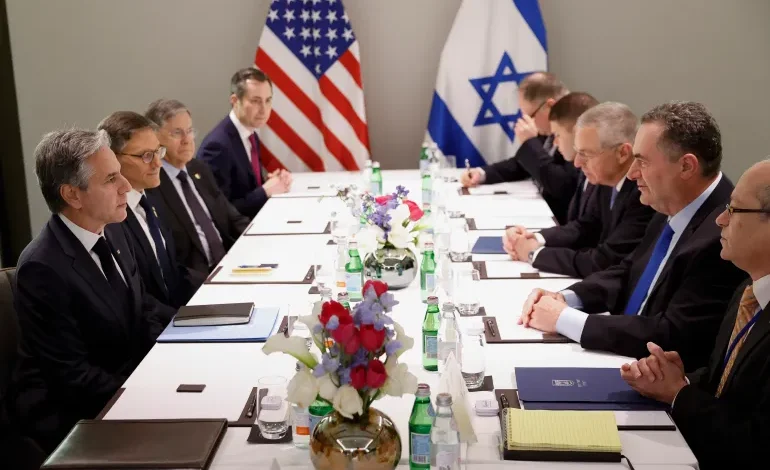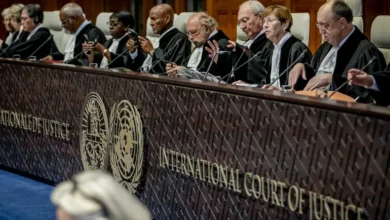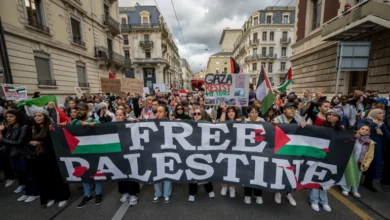‘Still no endgame’ as Blinken concludes latest Middle East tour: Analysts

As the United States’ top diplomat concludes his fourth tour of the Middle East since the war in Gaza began, foreign policy analysts are questioning whether the visit was an act of diplomacy — or an exercise in “damage control”.
On Wednesday, Secretary of State Antony Blinken travelled from Israel to the West Bank and then Bahrain. The stops were part of a tour that included visits to Turkey, Greece, Jordan, Qatar, the United Arab Emirates and Saudi Arabia, with a final stop in Egypt on Thursday.
Much of the attention was on the US’s continued support of Israel, as it continues its months-long military campaign in Gaza. An estimated 23,357 Palestinians have died in that offensive, amid mounting concerns over human rights violations.
At a Tel Aviv news conference on Tuesday, Blinken ran through oft-repeated themes: that the administration of US President Joe Biden “continues to stand” with Israel but that civilian casualties in Gaza remain “far too high”.
Analysts described the latest tour as an attempt at “face-saving”, as Blinken sought to walk a fine line between exerting influence over Israel and failing to publicly exercise any real leverage.
“We want this war to end as soon as possible,” Blinken told reporters on Tuesday.
But three months into the war, an “endgame” remains elusive, said Michael Schaeffer Omer-Man, the director of research for Israel-Palestine at Democracy for the Arab World Now (DAWN).
“There’s still no plan,” he told Al Jazeera. He cast doubt on Israel’s stated mission of eliminating the Palestinian group Hamas as part of the war.
Critics warned that the US and Israel are also articulating different visions for the path forward after the war.
On his visit to Tel Aviv, for example, Blinken called on Israel to accept a two-state solution for Palestine, something he again discussed with Palestinian Authority President Mahmoud Abbas on Wednesday.
But Netanyahu has repeatedly rejected any moves towards a two-state solution and has said Israel will maintain security control over Gaza for an indefinite period after the war.
Two far-right Israeli officials — Security Minister Itamar Ben-Gvir and Finance Minister Bezalel Smotrich — have also voiced a desire for the “voluntary migration” of Palestinians out of Gaza, something critics have interpreted as a push for ethnic cleansing in the enclave.The latest rhetoric underscored the “yawning gap” between Washington’s vision for a post-war Gaza and what Israel’s government is willing to accept, according to Joshua Landis, the director of the Center of Middle East Studies at the University of Oklahoma.
‘Preempt’ ICJ hearings
Still, Blinken sought to claim some victories during the trip. He announced, for instance, that US and Israeli officials had agreed on a plan for a United Nations assessment mission in northern Gaza to “determine what needs to be done to allow displaced Palestinians to return safely to homes in the north”.
That announcement came before the World Health Organization (WHO) cancelled its latest aid mission to northern Gaza, saying Israeli approval and security assurances had not been granted.
Blinken also hailed Israel’s announcement that it would begin to shift some troops out of Gaza, describing it as a transition to a “lower-intensity phase” in the enclave.
On Monday, in interviews with the New York Times and Wall Street Journal, Israeli military spokesman Daniel Hagari said his country would move from the “intense-manoeuvring phase of the war” to “types of special operations”, in an effort to reduce civilian casualties. However, intense fighting would continue in the centre and south of Gaza.
Hours later, speaking at a campaign event in South Carolina, Biden said in unscripted remarks that he had been “quietly working with the Israeli government to get them to reduce and significantly get out of Gaza”.











